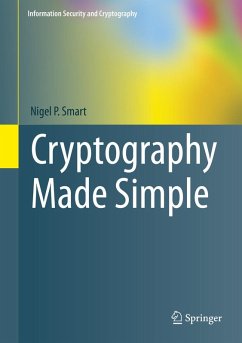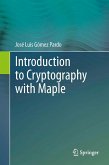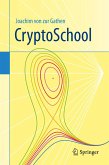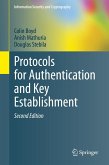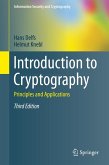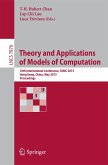In this introductory textbook the author explains the key topics in cryptography. He takes a modern approach, where defining what is meant by "secure" is as important as creating something that achieves that goal, and security definitions are central to the discussion throughout.
The chapters in Part 1 offer a brief introduction to the mathematical foundations: modular arithmetic, groups, finite fields, and probability; primality testing and factoring; discrete logarithms; elliptic curves; and lattices. Part 2 of the book shows how historical ciphers were broken, thus motivating the design of modern cryptosystems since the 1960s; this part also includes a chapter on information-theoretic security. Part 3 covers the core aspects of modern cryptography: the definition of security; modern stream ciphers; block ciphers and modes of operation; hash functions, message authentication codes, and key derivation functions; the "naive" RSA algorithm; public key encryption and signature algorithms; cryptography based on computational complexity; and certificates, key transport and key agreement. Finally, Part 4 addresses advanced prot ocols, where the parties may have different or even conflicting security goals: secret sharing schemes; commitments and oblivious transfer; zero-knowledge proofs; and secure multi-party computation.
The author balances a largely non-rigorous style - many proofs are sketched only - with appropriate formality and depth. For example, he uses the terminology of groups and finite fields so that the reader can understand both the latest academic research and "real-world" documents such as application programming interface descriptions and cryptographic standards. The text employs colour to distinguish between public and private information, and all chapters include summaries and suggestions for further reading.
This is a suitable textbook for advanced undergraduate and graduate students in computer science, mathematics and engineering, and for self-study by professionals in information security. While the appendix summarizes most of the basic algebra and notation required, it is assumed that the reader has a basic knowledge of discrete mathematics, probability, and elementary calculus.
Dieser Download kann aus rechtlichen Gründen nur mit Rechnungsadresse in A, B, BG, CY, CZ, D, DK, EW, E, FIN, F, GR, HR, H, IRL, I, LT, L, LR, M, NL, PL, P, R, S, SLO, SK ausgeliefert werden.
"The goal of cryptography is to obfuscate data for unintended recipients. ... The book is divided into four parts. ... The book is very comprehensive, and very accessible for dedicated students." (Klaus Galensa, Computing Reviews, computingreviews.com, October, 2016)
"Cryptography made simple is a textbook that provides a broad coverage of topics that form an essential working knowledge for the contemporary cryptographer. It is particularly suited to introducing graduate and advanced undergraduate students in computer science to the concepts necessary for understanding academic cryptography and its impact on real-world practice, though it will also be useful for mathematicians or engineers wishing to gain a similar perspective on this material." (Maura Beth Paterson, Mathematical Reviews, July, 2016)
"This is a very thorough introduction to cryptography, aimed at lower-division undergraduates. It is an engineering textbook that uses modern mathematical terminology (such as groups and finite fields). ... Bottom line: really for engineers, and a useful book if used carefully; the organization makes is easy to get overwhelmed by the background material before you get to the 'good stuff', and even the good stuff has an overwhelming amount of detail." (Allen Stenger, MAA Reviews, maa.org, June, 2016)
"This very thorough book by Smart (Univ. of Bristol, UK) is aimed at graduate students and advanced undergraduates in mathematics and computer science and intended to serve as a bridge to research papers in the field. ... Summing Up: Recommended. Upper-division undergraduates through professionals/practitioners." (C. Bauer, Choice, Vol. 53 (10), June, 2016)
"Cryptography made simple is a textbook that provides a broad coverage of topics that form an essential working knowledge for the contemporary cryptographer. It is particularly suited to introducing graduate and advanced undergraduate students in computer science to the concepts necessary for understanding academic cryptography and its impact on real-world practice, though it will also be useful for mathematicians or engineers wishing to gain a similar perspective on this material." (Maura Beth Paterson, Mathematical Reviews, July, 2016)
"This is a very thorough introduction to cryptography, aimed at lower-division undergraduates. It is an engineering textbook that uses modern mathematical terminology (such as groups and finite fields). ... Bottom line: really for engineers, and a useful book if used carefully; the organization makes is easy to get overwhelmed by the background material before you get to the 'good stuff', and even the good stuff has an overwhelming amount of detail." (Allen Stenger, MAA Reviews, maa.org, June, 2016)
"This very thorough book by Smart (Univ. of Bristol, UK) is aimed at graduate students and advanced undergraduates in mathematics and computer science and intended to serve as a bridge to research papers in the field. ... Summing Up: Recommended. Upper-division undergraduates through professionals/practitioners." (C. Bauer, Choice, Vol. 53 (10), June, 2016)
Es gelten unsere Allgemeinen Geschäftsbedingungen: www.buecher.de/agb
Impressum
www.buecher.de ist ein Shop der
buecher.de GmbH & Co. KG
Bürgermeister-Wegele-Str. 12,
86167 Augsburg
Amtsgericht Augsburg HRA 13309
Persönlich haftender Gesellschafter: buecher.de Verwaltungs GmbH
Amtsgericht Augsburg HRB 16890
Vertretungsberechtigte:
Günter Hilger, Geschäftsführer
Christian Sailer, Geschäftsführer
Sitz der Gesellschaft:Augsburg
Ust-IdNr. DE 204210010

